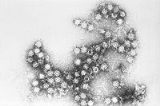
Coxsackie B4 virus
Encyclopedia
Coxsackie B4 virus is a virus
which can trigger an autoimmune reaction which results in destruction of the insulin
-producing beta cell
s of the pancreas
, which is one of several different etiologies of diabetes mellitus
.
An absolute deficiency of insulin renders the person a type 1 diabetic
. There are several viruses in the Coxsackie
family and many of them seem to evoke this response, as do several other agents. A genetic predisposition appears to be important, such that individuals with human leukocyte antigen
types DR3 and DR4 predominate in the affected population.
Virus
A virus is a small infectious agent that can replicate only inside the living cells of organisms. Viruses infect all types of organisms, from animals and plants to bacteria and archaea...
which can trigger an autoimmune reaction which results in destruction of the insulin
Insulin
Insulin is a hormone central to regulating carbohydrate and fat metabolism in the body. Insulin causes cells in the liver, muscle, and fat tissue to take up glucose from the blood, storing it as glycogen in the liver and muscle....
-producing beta cell
Beta cell
Beta cells are a type of cell in the pancreas located in the so-called islets of Langerhans. They make up 65-80% of the cells in the islets.-Function:...
s of the pancreas
Pancreas
The pancreas is a gland organ in the digestive and endocrine system of vertebrates. It is both an endocrine gland producing several important hormones, including insulin, glucagon, and somatostatin, as well as a digestive organ, secreting pancreatic juice containing digestive enzymes that assist...
, which is one of several different etiologies of diabetes mellitus
Diabetes mellitus
Diabetes mellitus, often simply referred to as diabetes, is a group of metabolic diseases in which a person has high blood sugar, either because the body does not produce enough insulin, or because cells do not respond to the insulin that is produced...
.
An absolute deficiency of insulin renders the person a type 1 diabetic
Diabetes mellitus type 1
Diabetes mellitus type 1 is a form of diabetes mellitus that results from autoimmune destruction of insulin-producing beta cells of the pancreas. The subsequent lack of insulin leads to increased blood and urine glucose...
. There are several viruses in the Coxsackie
Coxsackievirus
Coxsackievirus is a virus that belongs to a family of non enveloped linear positive-sense ssRNA viruses, Picornaviridae and the genus Enterovirus, which also includes poliovirus and echovirus. Enteroviruses are among the most common and important human pathogens and ordinarily its members are...
family and many of them seem to evoke this response, as do several other agents. A genetic predisposition appears to be important, such that individuals with human leukocyte antigen
Human leukocyte antigen
The human leukocyte antigen system is the name of the major histocompatibility complex in humans. The super locus contains a large number of genes related to immune system function in humans. This group of genes resides on chromosome 6, and encodes cell-surface antigen-presenting proteins and...
types DR3 and DR4 predominate in the affected population.

